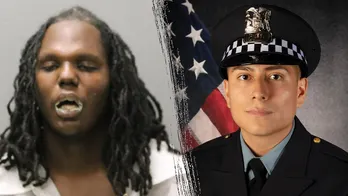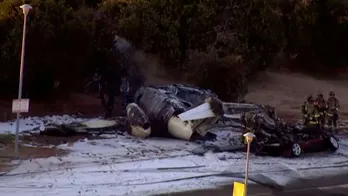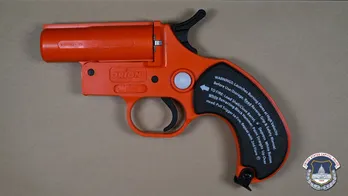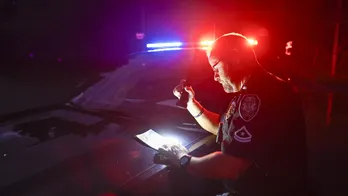One family donates four kidneys to save a New York man’s life: ‘Defied all odds’
As many Americans focus on holiday shopping, Mark Fenrich, 34, is celebrating the gift of life — which he's received not once, but four times.
During his lifelong struggle with kidney disease, the New York IT project manager has received a total of four kidney transplants from four different members of his family.
Fox News Digital spoke with Fenrich and one of his surgeons, Dr. John Bynon from the Memorial Hermann Transplant Center at Texas Medical Center in Houston, about how his kidney transplant journey has "defied all odds."
ARKANSAS MILITARY VETERAN RECEIVES WORLD’S FIRST WHOLE-EYE AND PARTIAL-FACE TRANSPLANT
Fenrich received his first transplant from his mother when he was just a toddler, at 21 months old.
"As I grew up, my parents treated me like a normal child," he said. They didn't emphasize "that I had this looming thing in the background."

Fenrich (far right) is pictured with Dr. Bynon (second from left) and other members of his care team. He described working with the team at Texas Medical Center as "a dream come true." (Mark Fenrich/Memorial Hermann Transplant Center)
At around 12 or 13 years old, when Fenrich's kidney failed and he needed a second transplant, he started to realize his condition was a "bigger issue."
The second transplant came from Fenrich’s father.
PIG HEART RECIPIENT'S ‘LAST WISH’ WAS TO HELP DOCTORS LEARN FROM PROCEDURE, DYING MAN SAID: ‘WE WILL MISS HIM'
"Then once all the fanfare around the actual event itself settled down, I just kind of forgot about it for a while, other than taking my daily meds," he said.
In 2015, when Fenrich was 26, he needed yet another kidney — which he received from his uncle.
"We were hoping that would be the last one I needed, but it didn't work out that way," he said.

Fenrich is pictured with his wife, Erin Fenrich, before his kidney transplant. (Mark Fenrich)
In December 2022, Fenrich’s third transplanted kidney began to fail. On Jan. 1, he started on dialysis, a treatment that helps the body remove extra fluid and waste products from the blood when the kidneys are no longer able to do so.
"I was bound to a dialysis machine three times a week, three hours at a clip," he said. "I joke that it’s the part-time job that nobody wants — but you have to do it literally just to survive."
At first, Fenrich’s transplant doctors in Houston were hoping the kidney would regain its function, but too much damage had already been done.
FRIENDS SHORTEN KIDNEY PATIENTS' LONG WAITS FOR TRANSPLANTS TO MERE MONTHS BY DONATING ORGANS
The doctors determined that he had a genetic disorder called aHUS (atypical hemolytic uremic syndrome), which causes small clots to form in the blood vessels, blocking blood flow to the kidneys.
This can lead to kidney damage or failure.
Fenrich now needed another kidney — but asking people to donate was never something he felt comfortable doing, he said.

During his lifelong struggle with kidney disease, Fenrich has received a total of four donated kidneys from four different members of his family. (Mark Fenrich)
His wife, mother and father put out the message to the extended family. At first, one of Fenrich’s cousins volunteered but ultimately changed his mind once at the medical center.
"Ultimately, his brother, Steven, came forward and wanted to donate," Fenrich said.
A few weeks later, Fenrich received his fourth kidney in April 2023.
The surgery was especially complicated, as each previous operation had "used up" a transplant site — "so we had limited places to put a new kidney," Bynon told Fox News Digital.
"There's really no dollar amount, and no words that I could say, that would be sufficient to thank them."
Another element of risk was that only about one out of five people who have had a previous transplant get a second chance at the surgery because they become "sensitized," the doctor noted.
"It's hard to find a kidney that [the body] won't reject right away," he said.

Fenrich is pictured with his cousin, Stephen DiGiorgio, who donated his most recent kidney transplant. (Mark Fenrich)
In Fenrich’s case, the surgery was a success. He described working with the team at Texas Medical Center as "a dream come true."
A few months later, he said he is feeling healthy and strong.
To prevent another kidney rejection, Fenrich is now taking a medication called eculizumab, which has been shown to be effective in treating his genetic condition.
"It’s a rather pricey medicine, but it basically stops the rejection process in its tracks," said Bynon. "And so it really opened the door for a lot of people who had aHUS to get a transplant."
LIFE AS A PATIENT IN NEED OF ORGAN DONATION: NEW HAMPSHIRE MAN WAITS FOR KIDNEY, READY TO 'ROCK AND ROLL'
Before the medication was available, the doctor said, many people with kidney failure would get a transplant, only to have it work for a short time or not at all.
"The development of this drug and its routine use for people like Mark has been a godsend for those patients," he said.
"When you identify a patient who has aHUS, the important thing is to treat them at the time of transplant or right before the transplant, so you can prevent this process from ever starting."

Mark Fenrich is pictured with his uncle, Joe Fenrich, after receiving his third transplant. (Mark Fenrich)
Fenrich also gets blood work once a month to ensure that his new kidney is healthy and functioning properly, and sees his doctors once or twice a year.
‘Come a long way’
Transplant medicine has come a long way, Bynon noted.
"When I started doing this almost 30 years ago, almost everybody had rejection — a lot of people lost their kidney in the first six months," he said.
"We've come a long way. Today, because the medicines are so good, acute rejection is a very rare event."

"There's really no dollar amount, and no words that I could say, that would be sufficient to thank them," Fenrich said of the family members who donated kidneys to him over the years. (Mark Fenrich)
Long-term compliance with the medicines is key, the doctor noted — "otherwise, your body will find the kidney and will try to kill it because it's not part of you, even if it’s a close match."
Given the high quality of the fourth kidney Fenrich received, Bynon said the hope is that it will last for the rest of his life.
SINGLE DAD RECEIVES KIDNEY DONATION FROM TOTAL STRANGER WHO REPLIED ON SOCIAL MEDIA
"It's a life-saving event," he said. "Maybe not as dramatic as a heart or liver transplant, but life-saving just the same."
Throughout the process, Fenrich said he has "never taken ‘no’ for an answer" and has advocated fiercely for himself.

Mark Fenrich is pictured with his father, James Fenrich, who donated his second kidney. (Mark Fenrich)
"I don't look at my kidney transplants as something that's ever held me back," he said.
"Energy-wise, I would say I'm better than where I was with the third transplant in terms of quality of life."
He said he is thankful for the family members who have stepped up and helped to save his life.
"My mom and dad were bound to do it and had no choice," he joked. "But my uncle and my cousin never had to step up and do any of this."
"I don't look at my kidney transplants as something that's ever held me back."
No amount of money could express his gratitude, Fenrich said.
"There's really no dollar amount, and no words that I could say, that would be sufficient to thank them."
Both Bynon and Fenrich stressed the importance of donor education.
CLICK HERE TO SIGN UP FOR OUR HEALTH NEWSLETTER
"They need to know exactly what they're in for, and if they have questions, they need to go to somebody who can provide answers," said Fenrich.
"For the recipient who needs a kidney, the only hope is that people are educated and will make the decision to donate."

"Energy-wise, I would say I'm better than where I was with the third transplant in terms of quality of life," said Fenrich, pictured with his wife and dogs. (Mark Fenrich)
To other people suffering from kidney disease, he stressed the importance of being proactive about taking steps to protect their health.
"You need to find the doctors who are pushing to get you transplanted and you need to advocate for yourself," he said.
CLICK HERE TO GET THE FOX NEWS APP
Bynon agreed that Fenrich was instrumental in his own positive outcome.
"I managed a small part of the vehicle that made this happen," he said. "Mark made a lot of this happen because he didn't say no. He kept fighting."
For more Health articles, visit www.foxnews.com/health.
Disclaimer: The copyright of this article belongs to the original author. Reposting this article is solely for the purpose of information dissemination and does not constitute any investment advice. If there is any infringement, please contact us immediately. We will make corrections or deletions as necessary. Thank you.







